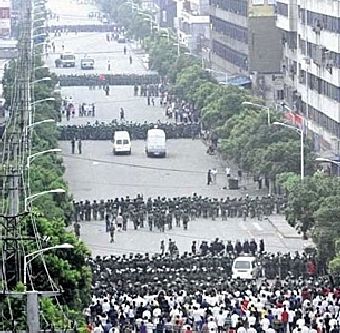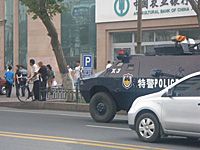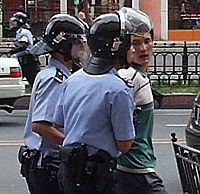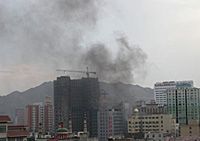
Publisher:
Bonnie King
CONTACT:
Newsroom@Salem-news.com
Advertising:
Adsales@Salem-news.com

~Truth~
~Justice~
~Peace~
TJP
Jul-06-2009 18:41

 TweetFollow @OregonNews
TweetFollow @OregonNews
Tight Security After Deadly Xinjiang Clash
Salem-News.comThe weekend clashes left at least 156 dead and hundreds injured.
 In this photo sent to RFA by a witness, cordons of Chinese riot police face demonstrators in Urumqi, July 5th. |
(HONG KONG) - Residents of the Xinjiang Uyghur Autonomous Region (XUAR) report a heavy police and paramilitary presence inside and outside the regional capital, Urumqi, where deadly clashes erupted at the weekend following a protest by ethnic minority Uyghurs, Radio Free Asia (RFA) reports.
"The situation in Gulja is so intense right now. I saw armed police everywhere when I went out to buy oil this morning. I saw five armored vehicles patrolling the streets. There are many police cars, patrolling on every street," one man told RFA’s Uyghur service.
"Military police are stationed in front of every government building and other work units. Since armed police blocked the main entrance to Ili Teachers' College, I went home through the back door," he said, adding that officials in the northwestern XUAR city of Gulja had imposed a curfew.
"They said they are going check every vehicle from other towns. They said it's better for us to remain inside," the man said.
The weekend clashes, which left at least 156 dead and hundreds injured, flared after an initially peaceful demonstration took to the city’s streets to protest how authorities handled recent violence between majority Han Chinese and mostly Muslim Uyghur factory workers in the southern province of Guangdong, witnesses said.
According to the official Chinese Xinhua news agency, some of the 156 dead were retrieved from Urumqi streets and lanes, while others were confirmed dead at hospitals. Xinhua also said more than 700 suspects had been taken into custody.
Urumqi is home to 2.3 million residents, including many Uyghurs, who have chafed for years under Chinese rule. The city is located 3,270 kms (2,050 miles) west of Beijing.
Security forces were now manning checkpoints at strategic points throughout the city, and ethnic minority officers were being drafted from outlying regions to help interrogate detained suspects, police said.
Security is always tight in the XUAR, and after the clashes phone service was in many instances suspended. Uyghur witnesses spoke on condition that they remain unnamed.
Strip-searches reported
"The information we are getting is that this is sort of spreading," World Uyghur Congress and Uyghur American Association leader Rebiya Kadeer told a news conference at the National Press Club in Washington late Monday.
 Armored police car in an Urumqi |
"We have heard news that in Hotan, in Aksu, in cities like Karamai, there were protests. And because of the tragic event, many people were killed and a lot of families and friends were killed. So others may have joined in other towns as well to protest," said Kadeer, whom Chinese authorities have blamed for instigating the clashes.
A former businesswoman in Xinjiang who served time in prison for alleged subversion, she denied instigating the clashes.
Sources at Xinjiang University estimate the number of dead at "nearly 400," including many outside Xinjiang University, Kadeer said, but she cautioned that "we can't confirm" that number.
A Uyghur man living in Saudi Arabia said residents of the old Silk Road city of Kashgar were reporting that some 300 people tried to stage a protest outside a mosque and at the local People’s Square but were quickly suppressed.
A Uyghur youth in Kashgar gave a similar account. "A protest was planned in Kashgar today at 3:00 p.m.," he said.
"But first they set up checkpoints on every road into Kashgar, then there were two or three Chinese soldiers in various places. But after 3:00 p.m., the government brought a lot of armed forces in around the Heytkar Mosque," the youth said.
"They blocked both sides of the mosque and wouldn’t let people in or out. They took a lot of photos and video and detained some people."
In Urumqi, meanwhile, the city was tense but calm.
Residents said numerous intersections had been blocked, and police were said to have surrounded a Uyghur settlement, called the Horserace Track, and detained all adult males.
"They are gathering them in the field, strip-searching them, and pushing them down to lie on the field, naked," one man said.
"This morning they also took away many youths from that area whether they participated [in the protest] or not. They just took away many Uyghur youths."
Electroshock weapons
Other witnesses described a heavy presence by security forces on Sunday.
Before the demonstrators reached the People’s Square in central Urumqi, armed police were in position and moved to disperse them, one witness said.
 A young Uyghur man is detained by |
Police "scattered them [the protesters]," he said. "They beat them. Beat them, including girls, very, very viciously," he said. "The police were chasing them and captured many of them. They were beaten badly."
"When the demonstrators reached the People’s Square, armed police suppressed them using electroshock weapons and so on," he said, adding, "After that, other protests erupted in Uyghur areas of town."
A Uyghur patient at the Dosluk No. 3 Hospital said she saw at least 10 to 15 injured men there. Official CCTV television said the hospital treated more than 100 people injured in the clashes, four of whom died.
"There were Uyghurs and Chinese, but mostly Uyghurs. There were both badly injured and lightly injured. Blood was everywhere," she said.
"Riots took place in bus stations, in tourist spots, and in shopping areas. Scores of Uyghurs were killed. Armed police were carrying automatic assault rifles and machine guns. There were thousands of soldiers. It had a tremendous impact, and we won’t be able to go to work for three days," another resident said, also speaking on condition of anonymity.
City 'now calm'
A police officer in Urumqi contacted by telephone early Monday said a curfew had been imposed on Uyghur areas, and residents said many shops were shuttered.
"People are dead. This might have planned by evil-minded people," the officer said.
All the shops in the area where the riot happened were closed today," one Uyghur girl said in an interview Monday.
"I walked around the streets a while ago. There were police and soldiers in the streets. There are some Uyghurs, but no Chinese. Today, for the first time in my life, I have a feeling that Urumqi is my hometown, because there were no Chinese in the streets. I am so glad."
A shop owner in Urumqi who declined to give his name said he had had to close for business as police swarmed through the city.
"We closed our doors from last night. Armed police dispersed the protesters in about two hours. Firefighters were also dispatched and last night police were all over the city," he said in an interview Monday.
Deadly clash in June was trigger
Uyghur sources said the protest Sunday was organized online and began early July 5 with about 1,000 people but grew by thousands more during the day. They gathered to demand a probe into the deadly fight in Guangdong late last month.
 Smoke rises over Urumqi from near |
In separate interviews, three Uyghur witnesses now under Chinese government protection said the fighting in Shaoguan began when Han Chinese laborers stormed the dormitories of Uyghur colleagues, beating them with clubs, bars, and machetes.
The clashes began late June 25th and lasted into the early hours of the following day. At least two people were killed and 118 injured, and witnesses said the numbers could be higher.
A number of Uyghurs have voiced anger and bitterness over the clash and accused police of doing too little, too late to stop it.
"If the government had given any explanation about the Shaoguan incident without hiding it from Uyghurs, this would not have happened in Urumqi," one Urumqi businessman said Monday.
"If the government had explained, as the demonstrators demanded, the protests would have dispersed," he said, referring to the demonstrations Sunday. "Instead, the government got heavy-handed, and this angered the people."
"Because the police took the protest leaders away, the protesters did not know what to do and acted aimlessly. If the leaders had not been captured, the demonstration would have ended peacefully. Trying to dissipate [the protest], the government only aggravated it."
Simmering resentment
Like Tibet, which erupted in protests in early 2008, the XUAR has long been home to smoldering ethnic tensions related to religion, culture, and regional economic development that residents say has disproportionately enriched and employed majority Han Chinese immigrants.
China has accused Uyghur separatists of fomenting unrest in the region, particularly in the run-up to and during the Olympics last year, when a wave of violence hit the vast desert region.
The violence prompted a crackdown in which the government says 1,295 people were detained for state security crimes, along with tighter curbs on the practice of Islam.
XUAR Party Chief Wang Lequan was quoted in China’s official media as saying the fight against these forces was a "life or death struggle," and he has spoken since of the need to "strike hard" against ethnic separatism.
Activists have reported wide-scale detentions, arrests, new curbs on religious practices, travel restrictions, and stepped-up controls over free expression.
Original reporting by Mamatjan Juma, Shohret Hoshur, Medina, and Mehriban for RFA’s Uyghur service and by Qiao Long for RFA’s Mandarin service. Translated from the Uyghur by Mamatjan Juma and from the Mandarin by Jia Yuan. Uyghur service director: Dolkun Kamberi. Mandarin service director: Jennifer Chou. Written and produced in English by Sarah Jackson-Han. Edited by Luisetta Mudie.
===================================================== Source: Radio Free Asia, a private, nonprofit corporation broadcasting and publishing online news, information, and commentary in nine East Asian languages to listeners who do not have access to full and free news media.
Articles for July 5, 2009 | Articles for July 6, 2009 | Articles for July 7, 2009
Salem-News.com:




Quick Links
DINING
Willamette UniversityGoudy Commons Cafe
Dine on the Queen
Willamette Queen Sternwheeler
MUST SEE SALEM
Oregon Capitol ToursCapitol History Gateway
Willamette River Ride
Willamette Queen Sternwheeler
Historic Home Tours:
Deepwood Museum
The Bush House
Gaiety Hollow Garden
AUCTIONS - APPRAISALS
Auction Masters & AppraisalsCONSTRUCTION SERVICES
Roofing and ContractingSheridan, Ore.
ONLINE SHOPPING
Special Occasion DressesAdvertise with Salem-News
Contact:AdSales@Salem-News.com
Terms of Service | Privacy Policy
All comments and messages are approved by people and self promotional links or unacceptable comments are denied.
Amigo July 17, 2009 11:58 pm (Pacific time)
My brother in Xinjiang have been very good, why do you love the West want to finance our domestic political purposes to undermine my country's stability? What is the purpose of you? We do not undermine the Muslims, the appearance of the rebels who are Muslims, the terrorists are inside, you have to look at the nature of them, not their appearance!
Amigo July 17, 2009 4:11 am (Pacific time)
This report is not the first photo shoot in Xinjiang, which is Shishou in Hubei Province in 2008 occurred in the city with groups of events, why do you foreigners like say in wrong way? Please come up with conclusive tell you all right? Originally, I think you see a foreigner very friendly, but I found out that my idea is wrong, you always biased my motherland! Why? We miss you so what? You what my country is full of bias? ! ! ! Why? Do you want us to China's young people more and more offensive to you! ? The more you wrong in casually reported that more young people in China hate you! Remember, you do act now, will be 30 years so that you try this flavor! ! ! ! !
Editor: Well I made a mistake about a photo while trying to educate people, and you berate me with a babelfish translation of English. Is that a double standard? Insult me for presenting an incorrect photo like this? Just know that most U.S. news agencies don't even pay attention, and we are trying. I notice that you don't try to correct the RFA article itself; why don't you pressure your fellow Chinese to stop persecuting the nation's Muslim population, that would be a better use of your time.
[Return to Top]©2026 Salem-News.com. All opinions expressed in this article are those of the author and do not necessarily reflect those of Salem-News.com.